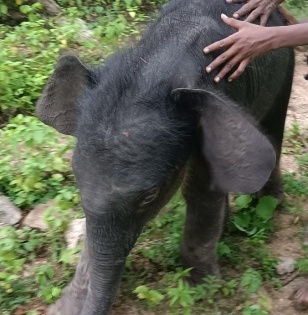Baby elephants force herd to stay back in India
By IANS | Published: December 30, 2022 03:15 PM2022-12-30T15:15:03+5:302022-12-30T15:30:22+5:30
Pilibhit (UP), Dec 30 Two baby elephants have forced a herd of 35 elephants to stay back in ...

Baby elephants force herd to stay back in India
Pilibhit (UP), Dec 30 Two baby elephants have forced a herd of 35 elephants to stay back in India because the they could not cross the Sutia river.
The herd had migrated from Shuklaphanta national park of Nepal to the South Kheri Forest division in Uttar Pradesh.
The herd, said forest officials, continues to stay and move in forest regions in a stretch of 20 to 25 km.
Officials said two herds of jumbos from Nepal comprising 55 to 60 tuskers, including female and adolescent elephants, had migrated from Shuklaphanta national park of Nepal to South Kheri forest division between August and October this year.
Sanjay Biswal, the divisional forest officer, said: "The first herd of 25 to 30 elephants from Nepal migrated via Pilibhit tiger reserve and Kishanpur wildlife sanctuary of Dudhwa tiger reserve (DTR) and reached Mailani forest beat of DTR's buffer zone on August 26 and moved after two-three days to Saijania forest beat of South Kheri division to stay there for over a fortnight.
"After feeding on the standing crops in an agricultural stretch of about three kilometres, they stayed at Benipur forest beat in Mohammadi Forest range for another 15 to 20 days. This was the time when another herd of around 30 to 35 jumbos from Nepal joined the first one on October 1."
Finally, after spending around 20 days in Maheshpur forest beat of the same forest range, one herd returned back while the second with two baby elephants, that were born in forest area of the district on September 11 and November 1, still continues to stay and move in forest regions in a stretch of 20 to 25 km, he added.
"We think that the jumbos are staying here, contrary to their innate nature of returning to their habitat of origin in a month or two, for two reasons. Firstly, the two little calves are too young to migrate a long way of around 100 km between Shuklaphanta national park and Mohammadi Forest range via PTR and Kishanpur wildlife sanctuary and secondly, it is almost impossible for them to cross Sutia river, a tributary of river Sharda," Biswal said.
Sanjay Kumar Pathak, the field director of DTR, said that teams of forest as well as Dudhwa National Park authorities had been formed to keep close watch of the movement of the herd to avoid any confrontation with local farmers.
"The forest teams have been deployed specifically in view of the resentment brewing among the local farmers due to the damage of their standing crops by the herd from Nepal which barge into agricultural fields along with two little calves. At such a juncture, we are coping with a challenging situation to protect the baby jumbos from any possible human attack as well as to save the lives of villagers."
Disclaimer: This post has been auto-published from an agency feed without any modifications to the text and has not been reviewed by an editor
Open in app